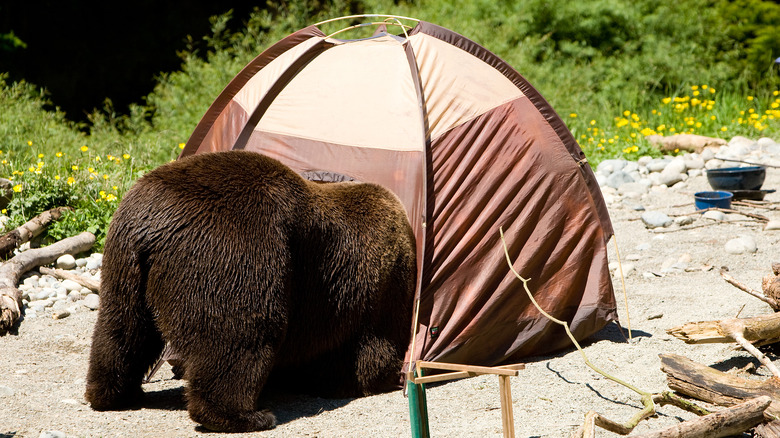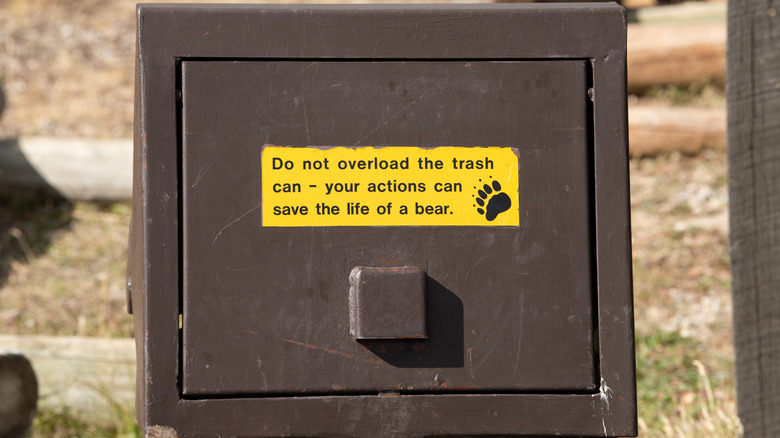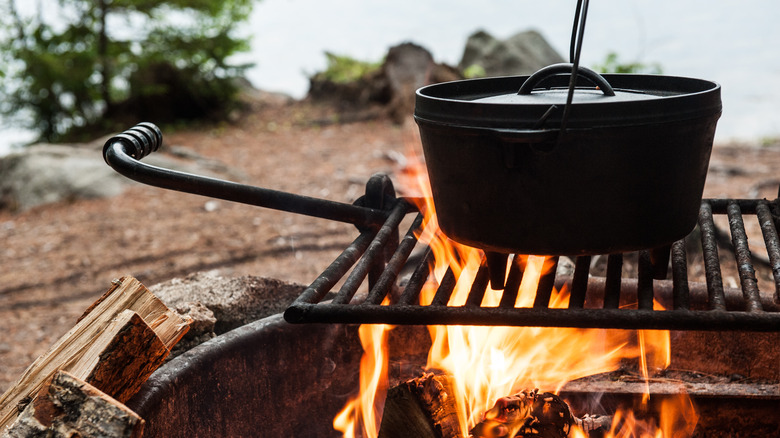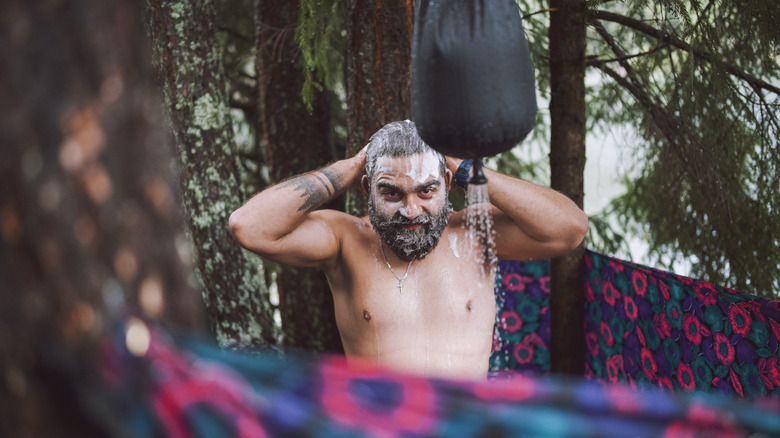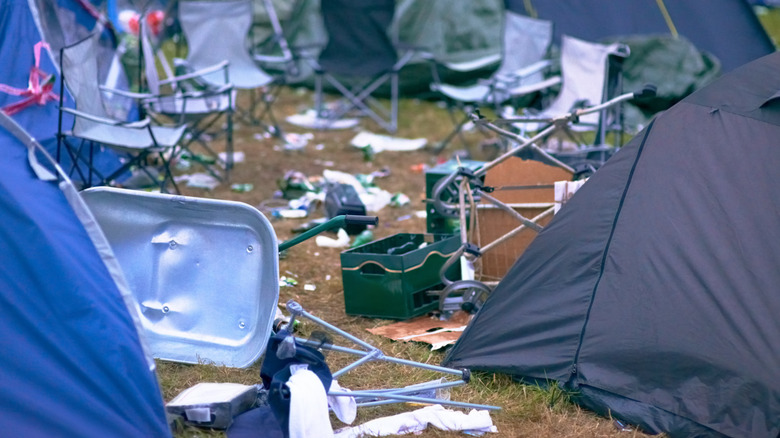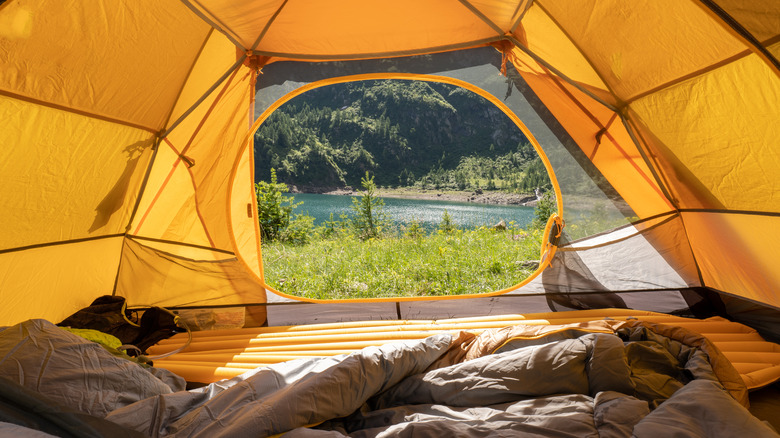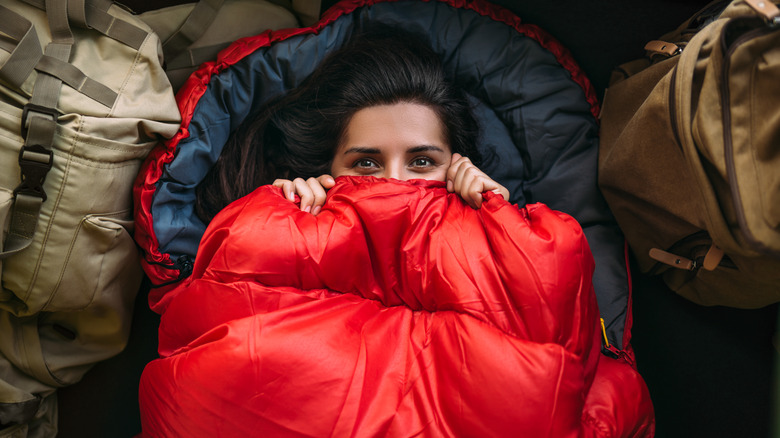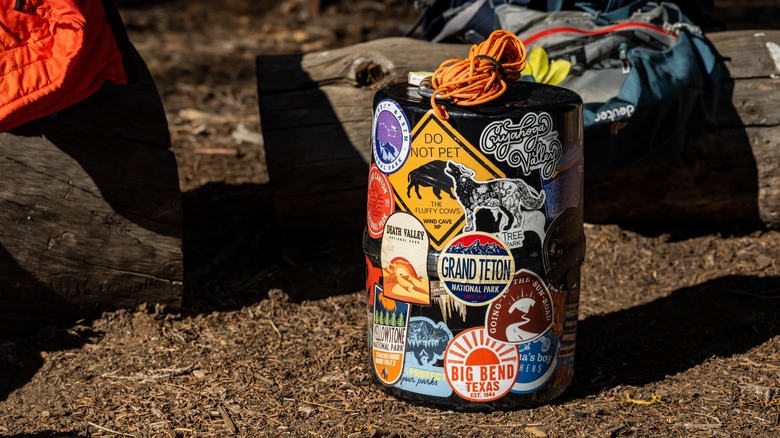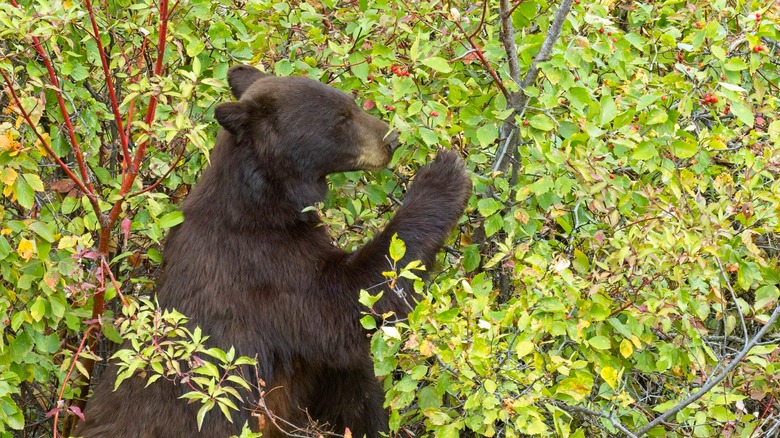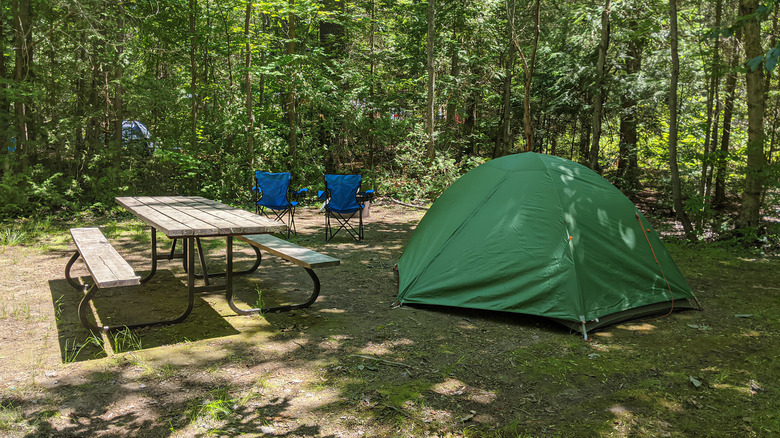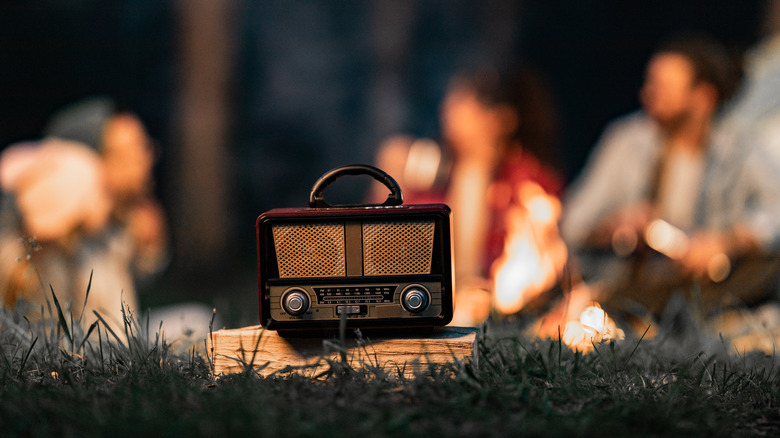Common Camping Mistakes That Attract Bears To Your Site
Contrary to what some believe, bear encounters aren't all that common. Attacks on humans are even less common. Rest assured that the chances of being confronted by an aggressive bear are slim when exploring nature. At between 500 and 3,000 reported human deaths by hippos per year, you're far more likely to be harmed by a hippo than a bear. On average, there are only 40 reported bear attacks on humans each year worldwide.
While even in the best camping spots, people may worry about bear encounters turning deadly, likely, any bears wandering the site are just there because they realized there's food or other items they'd like to investigate. Usually, bears simply rummage around a campsite, hoping to find something interesting or tasty, just as they would in any other part of their territory. Any campsite encounters, especially escalated ones, are typically avoidable. However, there may be plenty of novice campers who aren't aware of all they're doing to attract bears. For the next time you take a trip to the great outdoors, here are some common camping mistakes that attract bears to your site.
Not stashing your trash
Disposing of waste properly is one of the most well-known principles of the Leave No Trace organization. Proper waste disposal means more than just throwing your wrappers, paper plates, and other trash into trash bins. When camping, correct trash keeping and disposal is just one piece of protecting yourself, your fellow campers, and the wildlife that calls the area home.
The trash you accumulate while camping needs to be stored and kept in a safe location until you're finished camping or able to transport it to a proper waste site. Everything brought into campsites carries scents that may attract local wildlife, especially curious and hungry bears. This means that all trash, not just food waste, should be double-bagged and sealed. Preferably, even after double-bagging, all garbage should be kept in bear-proof containers when possible. Trash should never be left outside either.
By properly storing waste until it can be removed from the area, campers are helping create a bear-free space that's safer for the bears who call the area home, and the humans who are visiting.
Leaving out food and beverages
One part of staying overnight in nature that so many look forward to enjoying is a good camp meal. As it turns out, campers aren't the only ones who look forward to having a bite to eat around the campfire. Food and beverages are just what curious and hungry bears are looking for at a campsite. Even when you aren't actively preparing or eating a meal, a bear's strong sense of smell can pick up on your belongings.
When not being prepared or consumed, food and drinks should be sealed and stored in bear-proof containers and kept in a separate area of the campsite. Food and drink shouldn't be stored in tents or vehicles, but in an area of the camp away from everything else. Some campsites even provide lockers that are nearly impossible for wildlife to get into, specifically for campers to store their belongings away from bears. If your campsite has one of these lockers, be sure to use it for all food and drinks.
Not storing toiletries
So you've stored your food and drinks, and you've stashed your trash. What else can be done to prevent an encounter with a bear that feels far too close for comfort? Infrequent, new, or even some of those who camp pretty often may not realize that toiletries can attract bears as much as other personal belongings like food and trash.
The smell of soap, deodorant, and even toothpaste stand out amongst other scents in nature and when a bear catches wind of them, it'll want to investigate. Along with trash, food, and drinks, toiletries should be kept in sealed containers. If you're putting them in a plastic bag, double bag them, and if there's a bear locker made available at your campsite, place them inside.
The best way to deodorize your smelly belongings like toiletries is to forgo them altogether. Perfumes, deodorants, and lotions can all be left behind rather than included in your camp gear. If you insist on toiletries, try finding fragrance-free versions of your favorites. However, know that bears don't favor the natural scent of humans, so your own smell is actually a great way to deter a bear in the first place.
Dirty campsites
Most campers leave home with everything packed neatly into their bags. However, once each piece of gear, food, and clothing item is removed, it can be difficult and time-consuming to put back each time. In an effort to enjoy a camping trip, one might just let loose and leave their belongings out rather than maintain a tidy site. This is one way to ensure a visit from a local bear.
Keeping a messy campsite littered with trash, personal items, and food scraps even when you or other campers are still spending time in the campsite is a fast way to attract bears. While camping, the best thing to do is to actively clean up after yourself as soon as you're finished with what you're doing. Pick up trash, put away your belongings, and don't burn excess food after you're finished with a meal. The smell of burning food will go out like a beacon to bears. Any scraps or excess should be stored away safely with the rest of your trash.
Messy tents
The campsite is tidy and food is stored in bear-proof containers, what else could be attracting a bear to your space while camping? An unkempt tent can send off all different kinds of scents that stand out to a bear. Just because animals can't see the mess beyond the tent walls, doesn't mean they don't know it's there. If a tent smells interesting, they're going to want to check it out.
Some common belongings people take camping with them to keep on their person include snacks, deodorant, bug spray, and other personal items. Each of these gives off its own smell and it's likely they all were packed in one or two bags. Those bags are ripe with these scents and should not be kept in tents. Especially while someone is sleeping in that tent. Part of keeping a clean tent when camping is making sure there are no items with fragrance inside. The fewer scents attracting a curious and vulnerable bear to a tent, the better.
Unsafe sleeping
A skilled camper maintains a clean campsite and tent and properly stores their food and trash in bear-proof containers to prevent any unwanted visitors to their site. However, one frequently overlooked detail in deterring wildlife visitors might be the clothes on your back.
After a long day of hiking or setting up camp, it's easy to give in to exhaustion and hop into a sleeping bag to drift off. However, taking just a few moments to change from day clothes into night clothes could prevent accidentally luring a bear into your perimeter or even into your tent.
Clothing worn throughout the day absorbs fragrance from a multitude of personal belongings like deodorant, bug spray, and lotion. It also soaks in scents from cooking and campfire smoke. Wearing this same clothing to sleep at night can let bears know that all these items are somewhere near your tent, and to a bear, this is worth checking out. To keep yourself and the bear safe from harm, changing outfits and placing your day clothes in a safe space is worth it.
Not using bear-proof storage
Keeping your trash, food, and personal belongings like clothing and toiletries safely stored is a highly stressed point in Camping 101. While storing these items is essential, using a bear-proof storage system is key. For those camping in bear country, depending on the area, there are different types of bears you may encounter. Luckily, a lot of campsites provide food lockers to keep your belongings in. These lockers are designed to keep wildlife, like bears from gaining access.
If using a cooler to store food, it should be bear-resistant. If you don't need something as large as a cooler, but still have belongings that will entice wildlife, using a bear canister is a good idea and even mandatory in some popular locations where bear encounters are common. These canisters are made to lock any fragrance in, while keeping wildlife out. Bear-proofing your storage systems while spending time outdoors will keep your trip as safe and relaxing as possible for you and any local bears.
Setting up camp near a bear's food source
Not all campsites are created equal. Some of them are much safer than others. To make sure the area you choose is safe, do a thorough check of your surroundings. There are specific details you don't want to see in a safe location. The absence of things like berries and animal droppings are particularly good signs.
When looking around, check if the area is a spot where a bear may come to eat. Berry bushes are a source of food for bears. If you spot them, you shouldn't set up camp nearby. Another thing to look for is possibly the most important creature to beware of. Humans. Signs that other campers have been there before you aren't good. If there were campers in the area before you, there shouldn't be any trace of them. So if you see trash or food left behind, it's a good sign that the prior campers didn't clean up after themselves and bears may already be alerted to the area as a food source.
Not using a bear-muda triangle
After locating the perfect location to set up your tent with no food sources or traces of human belongings nearby, there's a good rule of thumb when organizing belongings. The areas designated for storage, sleeping, and cooking should all be separate from one another.
Ideally, each of these stations should be at least 70 feet away from the others, and if at all possible, your tent should be upwind from where you cook to ensure safety while sleeping or relaxing inside. Once you've got each area separated like this, it should look like a triangle. This triangle of safety is known as the bear-muda triangle, and it's one camping skill you won't regret keeping in mind on your next trip.
Keeping these items separate from each other may not keep curious bears away all the time, but it will make sure that the bear is less likely to destroy the entire campsite after it's done exploring one portion of it.
Being too quiet
No one wants to be the annoying camping group that keeps everyone up at night and disturbs their peace during the day. However, it is possible that being too quiet could be making wildlife feel comfortable investigating your space. Bears don't like loud, unfamiliar noises or confrontations. They'll avoid both if at all possible.
Obvious activity will most likely lead a bear to move along and avoid your campsite entirely. If your group is taking it easy, you're alone, or you've left the site to go exploring, leaving a radio on can deter any curious bears. It isn't necessary to blast the volume and let the whole forest know you're camping. A low volume is good enough to alert wildlife of your presence.
Bear encounters are rare, and despite what you may have heard, the likelihood of needing to play dead to save yourself from a bear is very small. Doing your best to avoid bears entering your campsite will keep you both safe from harm. Keeping these bear deterrents in mind will help you be a more responsible camper and friend to wildlife.
